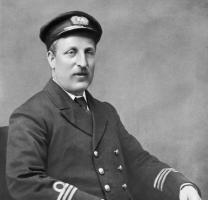 One hundred and one years ago today, on July 27th, 1916, Captain Charles Fryatt was executed by the Imperial German Navy for attempting to ram the German U-boat, U33, with the 1902-built passenger ferry, SS Brussels, owned by the Great Eastern Railway.
One hundred and one years ago today, on July 27th, 1916, Captain Charles Fryatt was executed by the Imperial German Navy for attempting to ram the German U-boat, U33, with the 1902-built passenger ferry, SS Brussels, owned by the Great Eastern Railway.
In March of 1915, near the Maas light-vessel off the Dutch coast, U33 surfaced and ordered the Brussels to stop. Captain Fryatt believed that the submarine was loading a torpedo to sink the ferry and he ordered full speed ahead attempted to ram the submarine, forcing it submerge without damage. SS Brussels escaped and Captain Fryatt was awarded a gold watch by the Admiralty for valor. The watch was inscribed: Presented by the Lords Commissioners of the Admiralty to Chas. Algernon Fryatt Master of the S.S. ‘Brussels’ in recognition of the example set by that vessel when attacked by a German submarine on March 28th, 1915.
Fifteen months later, SS Brussels was captured by five German destroyers shortly after setting sail from the Hook of Holland. Fryatt, his crew and passengers were taken to an internment camp near Berlin. As reported by the BBC:
Fryatt was then taken away to Bruges to stand trial on charges of being franc-tireur – a civilian engaged in hostile military activity. His gold watch from the Admiralty was used as evidence against him and he was accused of sinking the German submarine – despite U-33 still being in active service. The hearing, sentence and execution by firing squad all took place on the same day, 27 July.
Fryatt’s execution was considered an outrage by the British and used as a recruiting tool and in swaying international opinion against the Germans.
In the United States, The New York Times denounced the execution as “a deliberate murder”. The New York Herald called it “The crowning German atrocity”. In the Netherlands, the Nieuwe Rotterdamsche Courant described the execution as “arbitrary and unjust”, while the Handelsblad Holland called it “A cowardly murder inspired by hatred and revenge”. In Switzerland, the Journal de Genève said “It is monstrous to maintain that armed forces have a right to murder civilians but that civilians are guilty of a crime in defending themselves”.
In 1919, Fryatt’s body was exhumed and returned to the United Kingdom for burial. On July 8, 1919, his funeral was held at St Paul’s Cathedral. Hundreds of merchant seamen and widows of merchant seamen and fishermen attended. Representing the Government were many members of the Admiralty, the Board of Trade, the Cabinet and the War Office.
